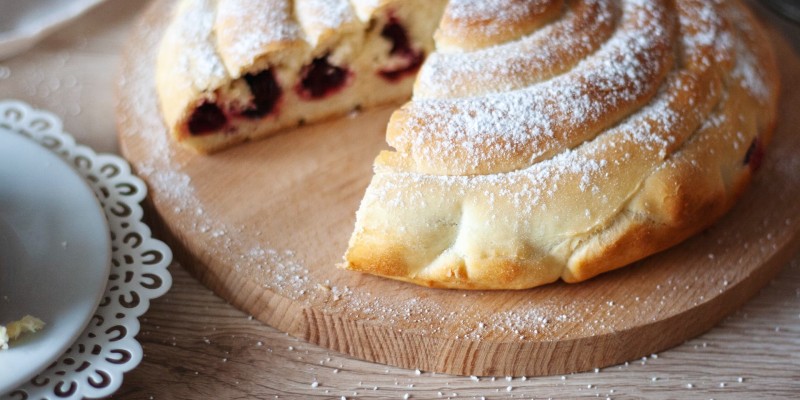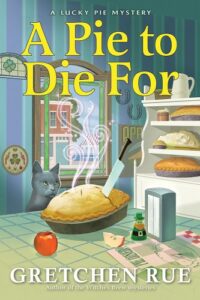The path from Sherlock Holmes to modern baking cozies may not seem like a direct route, but there are plenty of ways that Sherlock set the stage for our current iterations of beloved bakeshop heroines.
The moment John Watson meets Sherlock Holmes in A Study in Scarlet, the famous detective has taken over a university lab and is perfecting a chemical concoction for identifying the presence of blood. Holmes, a master observer, understands clearly that some results require careful composition and attention to detail. This scene being the point where we, as readers, first meet Holmes alongside Watson is important in that it shows us there is more to Holmes than simply a sharp eye and a propensity for mood swings. Sherlock respects science and chemistry, things that require sensitive balance and precision.
Most aficionados of the modern whodunnit appreciate the part Sherlock Holmes played in developing the genre—even if Sir Arthur Conan Doyle probably wasn’t expecting his most popular character to spawn a whole subgenre of female amateur sleuths. It is, of course, the amateur title we often forget when we think about Holmes. He was not a police officer or doctor or psychologist. He was merely a keen observer who paid attention and noticed things. One who very much fancied himself smarter than the so-called professionals.
This brings us to our modern heroines, who have plenty in common with Sherlock even if it isn’t an intentional homage. The modern cozy heroine is almost always an amateur investigator, who finds herself immersed in an investigation, usually at odds with the police. Unlike Holmes, they are typically pushed into these experiences against their will—or better judgement—whereas Holmes would lower himself to assist the police just to amuse himself. He was rarely the suspect at the center of an investigation as many of the more modern heroines find themselves to be.
Modern cozy heroines, especially cozy heroines who bake, are great counterparts to the Baker Street detective. Bakers are scientists in their own right. A delightfully charming saying goes that “baking is science for hungry people” and it’s a wonderful truism. Baking, more than cooking, is a very precise process that requires focus, attention to detail, and a careful hand in mixing various concoctions. Sounds a lot like a certain sleuth wiling away his time in a university lab. Bakers are modern day magicians, much like scientists, using things as simple as flour and water to create life (if you don’t think sourdough is magical, then think again).
A baker must also be able to solve mysteries in the kitchen. Why didn’t the bread rise enough? Why were the cookies flat? Why did the pie crust turn out too tough? The answer is usually as simple as a half teaspoon of baking soda, or the temperature of a room, but these seemingly unimportant details are what can make a delicious final product, or cause your baking to fall flat. Literally. A baker—much like Sherlock Holmes at a crime scene—must see what others do not, what the average eye passes over. A baker needs focus and a massive repertoire of knowledge just living in the back of their mind. Once, Holmes told Watson that he simply chose to forget things that had no importance to him, because there was only so much room in his memory, so why waste it? One must wonder if bakers simply discard their memories of historical factoids or names of presidents to better remember measuring conversions or acceptable substitutions for eggs.
Another thing bakers have in common with Holmes is the remarkable allowance of time to think. Holmes lounges around his apartment with seemingly nothing to do but mull over his current cases. Bakers, meanwhile, have the freedom to let their minds wander while stand mixers whir or dough gets folded under their knuckles. There is plenty of time to consider the finer details of a murder investigation while bread is proofing or pie dough is setting in the fridge. That kind of freedom to be able to work while also letting your mind work things out certainly helps make baking one of the most ideal professions for an amateur sleuth.
Of course, their hands-on access to food also explains who they are so frequently considered potential murderers when someone happens to die from poisoning.
That’s just how the cookie crumbles.
So while it may not seem like a natural evolution, I think it’s safe to say that our Baker Street detective would have probably enjoyed spending time in a bakery, and would certainly appreciate the way his modern amateur successors have turned their own expertise and attention towards assisting a poor police force who can’t seem to manage it on their own.
There are plenty of wonderful options in the bakery cozy subgenre to delight reader’s looking for a sumptuous mystery and even more delicious food—something Doyle’s books were severely lacking. The most natural starting point is Joanne Fluke’s Hannah Swensen mysteries, and of course Ellie Alexander’s wonderful Bakeshop Mysteries have plenty of books to choose from. Jenn McKinlay’s Cupcake Bakery Mysteries, and Valerie Burns’ Baker Street Mysteries are also wonderful additions to the genre. And then for more of a twist on the expected, there’s Misha Popp’s Pies Before Guys series where our heroine Daisy might actually be doling out something a little deadly with her baked goods… but it’s okay, these guys deserve it.
Certainly Sherlock Holmes, a noted master of poisons, couldn’t help but be impressed with such ingenuity.
And I think he’d agree that there was room for more than one amateur sleuth to lend a measuring spoon and a sharp mind over at Baker Street if the need struck.
***


















